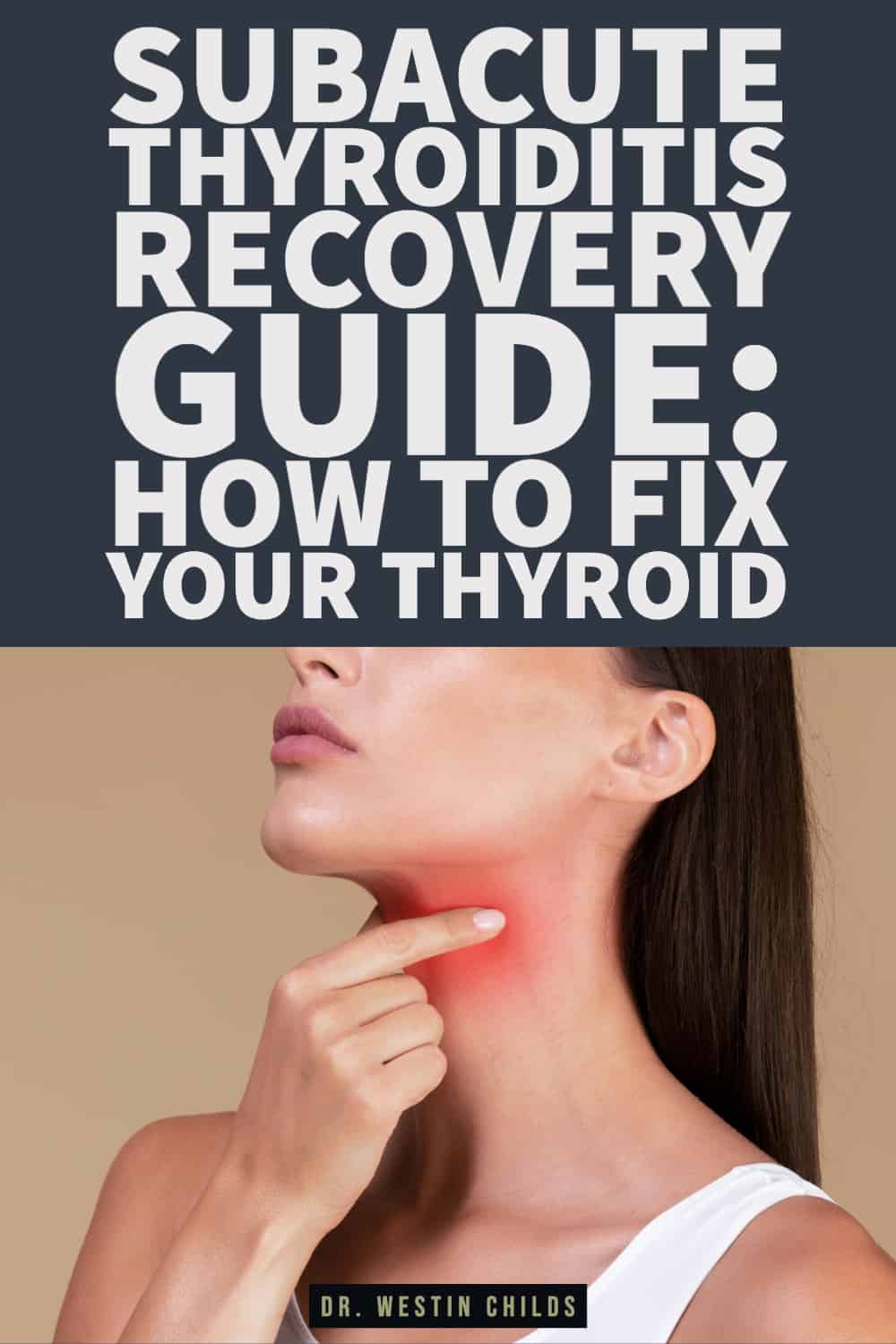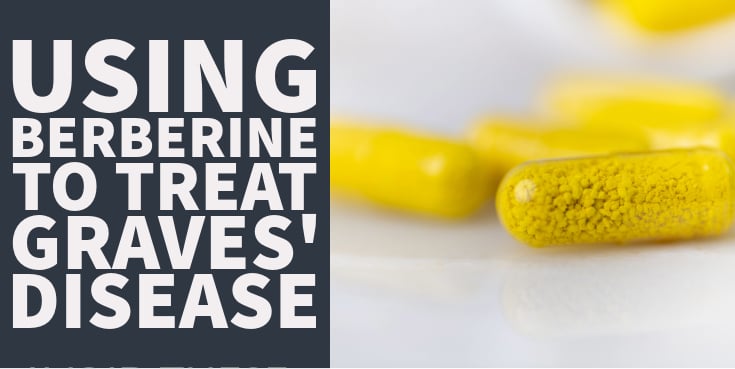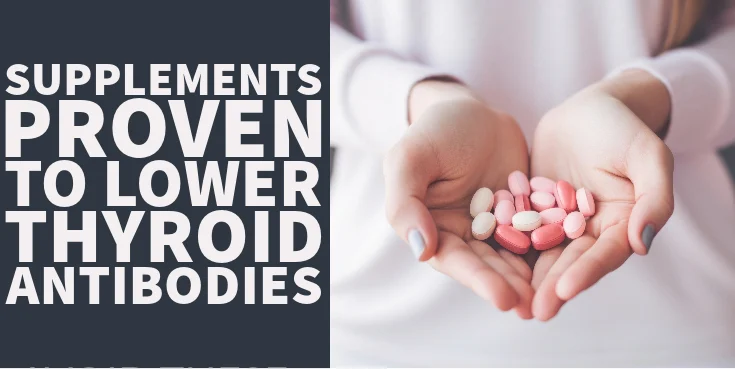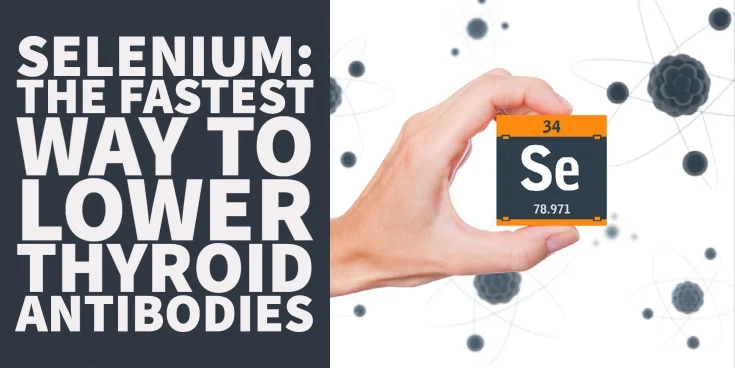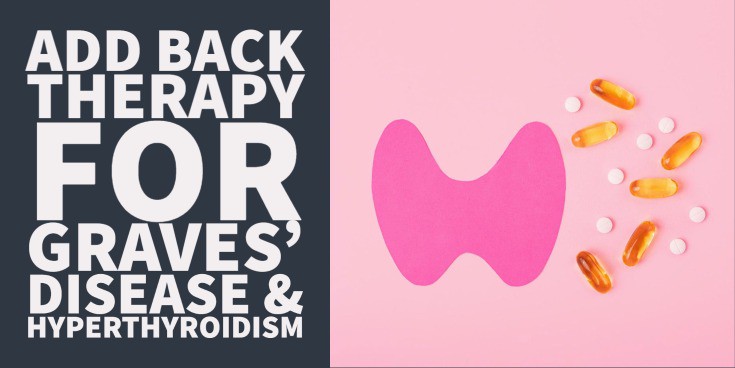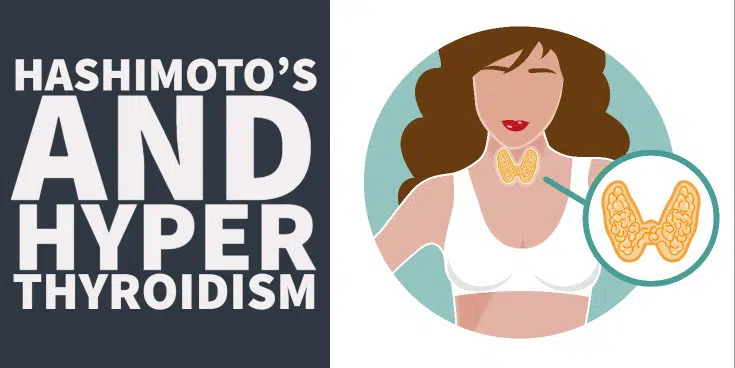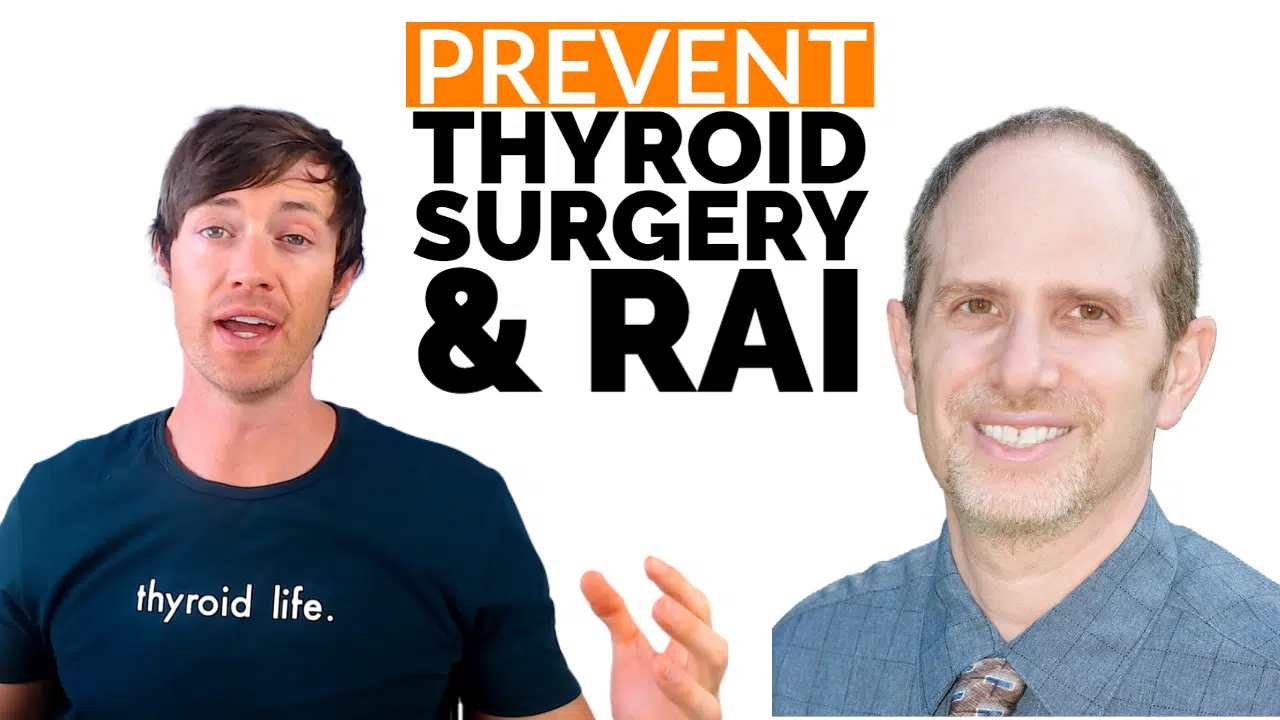Subacute thyroiditis is not the most common cause of thyroid related-issues, but it’s still important nonetheless.
This condition may result in pain in your thyroid gland and can be confused with other disorders such as Hashimoto’s thyroiditis and Graves’ disease.
Learn how to diagnose this condition, how long it takes to recover, and natural treatment options that may help in your recovery:
What is Subacute Thyroiditis
Like many medical conditions, Doctors tend to give odd-sounding names to certain diseases and conditions.
But don’t let these names confuse you or scare you.
Subacute thyroiditis is a type of thyroid condition which is self-limited and results in inflammation of the thyroid gland.
Put into simple easy-to-understand words, this means that something in your body triggered an inflammatory response in your thyroid gland.
The term self-limiting means that this condition will eventually go away on its own and usually without any treatment.
Subacute thyroiditis is a part of a long list of disorders that cause inflammation in the thyroid gland known as “thyroiditis”.
The term thyroiditis simply means “thyroid inflammation”.
Subacute thyroiditis is a specific variant of this condition and one which usually results in a very specific presentation (1).
Those with subacute thyroiditis usually fit the following mold:
- They are usually sick or ill and have symptoms such as muscle aches, fatigue, and a fever.
- Their thyroid is very tender to the touch (this differentiates subacute thyroiditis from the other conditions which are usually painless!).
- A virus usually triggered the inflammation in the thyroid gland.
- They do not have positive thyroid antibodies on lab testing.
Fortunately, subacute thyroiditis is not a very common condition because the body tends to “protect” the thyroid gland from infections that target other tissues.
Your thyroid gland comes equipped with a number of factors that protect it from infections including a high amount of iodine storage, production of hydrogen peroxide, and an encapsulation (2) which keep it safe from nearby anatomical structures.
These protective mechanisms make it so infections (including bacteria and viruses) have a hard time getting into your thyroid gland tissue.
You can compare this to other areas in your body such as your sinuses or your lungs which are often the casualty of infections such as strep throat or upper respiratory infections!
But this doesn’t stop all infections, especially some viruses, which have a tendency to “trigger” this condition.
Specific viruses have been known to result in all types of thyroiditis (3) including Hashimoto’s thyroiditis, subacute thyroiditis, and silent thyroiditis.
The good news is that most viruses do not require treatment (they aren’t like bacterial infections) which means your body and immune system will destroy them over a period of a few weeks to months.
But, as your body destroys the infection, it may accidentally damage your thyroid gland in the process.
This damage may lead to some of the characteristic symptoms seen in subacute thyroiditis such as pain in the thyroid gland.
But how do you know if you have this condition?
Symptoms & Recovery Time
There are 3 main stages of subacute thyroiditis and each stage is associated with a different set of symptoms.
You can use these stages to monitor your healing over time and they may be helpful to prevent confusion in diagnosis.
Let’s go over the stages below including how long you may expect to be in each one:
- Stage one – Thyrotoxicosis (4): Usually lasts 4-10 weeks.
- Stage two – Hypothyroidism (5): Usually 6-8 weeks.
- Stage three – Euthyroidism (normal thyroid function): This is when your symptoms should subside and you should return to normal.
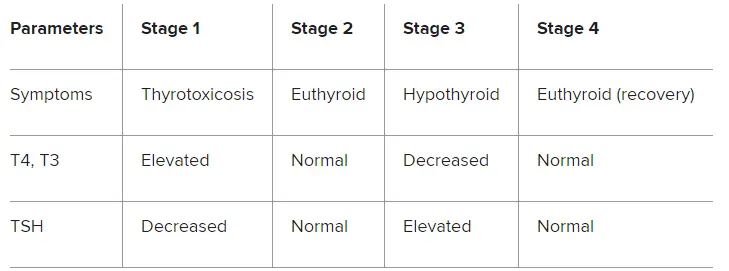
Each stage can be identified by both lab tests and by evaluating your clinical symptoms (how you are feeling).
The first stage is associated with the symptoms of hyperthyroidism and these symptoms are identical to the symptoms associated with other causes of hyperthyroidism.
This is important to note because you can’t tell that you have subacute thyroiditis in the beginning based solely on your symptoms.
Symptoms you may experience during the thyrotoxicosis phase include:
- Fatigue
- Fevers/chills
- Painful thyroid gland
- Body aches and pains
- Heart palpitations
- Diarrhea
- Sweating or flushing
- Anxiety
- Tremors of the extremities
- Weight loss
This phase usually lasts somewhere between 4-10 weeks and this is when you may present to your doctor because these symptoms are hard to ignore.
The second phase is known as the hypothyroid phase and occurs immediately after the hyperthyroid phase or thyrotoxicosis phase.
The symptoms associated with the hypothyroid phase are the exact opposite of the first stage and include:
- Cold intolerance
- Constipation
- Weight gain
- Depression
- Low body temperature
- Slow heart rate
- Dry skin
By this point, your fever and chills should have subsided and the pain in your thyroid gland should be reduced.
This phase lasts approximately 6-8 weeks as your body recovers and restores the damage done to your thyroid gland.
The last phase is associated is known as the “euthyroid” stage which simply means that your thyroid function has returned to normal!
Once you get through the first 2-3 months you should be back to feeling normal.
Approximately 95% of patients will return to normal after this period of time (depending on the cause of your condition).
Diagnosing Subacute Thyroiditis with Lab Tests & History
How is subacute thyroiditis diagnosed?
Like other medical diseases and diseases of the thyroid, this is done through the use of targeted lab tests and medical history.
If you suspect you have subacute thyroiditis (or any other thyroid-related issue) you should be evaluated with the following tests:
- Thyroid Function Tests – Thyroid function tests include TSH, free t3, and free T4. Depending on where you are at in your disease state you will have different lab results. During the hyperthyroid phase, your TSH will be very low or undetectable and during the hypothyroid phase, your TSH will be “high”.
- Thyroid antibody Tests – Thyroid antibody tests should be ordered to help differentiate between Hashimoto’s Thyroiditis, Graves’ disease, and subacute thyroiditis. This is important because all 3 may have some overlap in how they present. The presence of antibodies to your thyroid gland indicates an autoimmune disease such as Graves’ disease or Hashimoto’s.
- Ultrasound of the thyroid gland – An ultrasound of the thyroid gland may be helpful. If you have subacute thyroiditis your thyroid gland may be slightly enlarged during the inflammatory phase.
- Inflammatory Markers – Markers such as ESR and CRP may be elevated during the inflammatory phase and can help identify an inflammatory disorder in the body.
- Medical History – Your medical history is very important for diagnosis because it can help your doctor determine the cause of your problem. Many thyroid inflammatory diseases overlap in their symptoms but they all have unique characteristics which can your doctor differentiate between them.
Types of Subacute Thyroiditis
It’s very important for your Doctor to identify that you have subacute thyroiditis, and not another form of thyroiditis or thyroid disease because this condition typically does not require any treatment.
Subacute thyroiditis accounts for around 15-20% of patients who present with thyrotoxicosis and around 10% of patients who present with hypothyroidism.
This has to do with the fact that you may present at different times in the progression of your disease.
Remember:
In the beginning, you will experience the symptoms of hyperthyroidism, then you will experience the symptoms of hypothyroidism and lastly, you will return to normal thyroid function.
When you go to your Doctor will determine how your labs look and whether or not you fit into the “hyperthyroid” or “hypothyroid” category.
There are actually 3 main types of subacute thyroiditis recognized by medical professionals:
- Subacute granulomatous thyroiditis (6) – This condition is almost always the result of a viral infection and tends to go away on its own in a matter of weeks to months. This condition is differentiated from other causes because it is often associated with a thyroid gland which is very painful.
- Subacute lymphocytic thyroiditis (7) – This condition is also referred to as “painless thyroiditis” and can be immediately differentiated from granulomatous thyroiditis by this factor alone. This condition has an overlap between subacute thyroiditis and Hashimoto’s thyroiditis and may represent a condition on the autoimmune spectrum of thyroid disease.
- Subacute postpartum thyroiditis (8) – Subacute postpartum thyroiditis can be differentiated from the other two forms of thyroiditis because it tends to occur in the postpartum period (after pregnancy). This condition, like lymphocytic thyroiditis, may be on the autoimmune spectrum as they share similar findings when evaluated under a microscope.
Don’t let these types discourage you or scare you because, regardless of which type you have, they almost always go away on their own and without treatment.
Subacute Thyroiditis vs Graves’ Disease
Subacute thyroiditis should be differentiated from the autoimmune condition Graves’ disease at the time of diagnosis.
Both of these conditions may present with similar clinical symptoms but they can be differentiated on a few important points.
The first is that subacute thyroiditis is usually associated with thyroid pain and Graves’ disease is not.
The second is that subacute thyroiditis is NOT associated with positive antibodies in the serum while Graves’ disease usually is (9).

These points must be checked and evaluated early on in the progression of your symptoms because these two conditions are treated differently.
Graves’ disease is a condition that is progressive (meaning it gets worse over time) whereas subacute thyroiditis will almost always naturally improve without any therapies.
Graves’ disease also may require treatment such as the use of thyroid-blocking medications, thyroid surgery, or radioactive iodine ablation of the thyroid gland.
Because of the overlap between these two conditions your Doctor should take caution when testing and diagnosing your condition.
Natural Treatment Options
Is there any way to reduce the amount of time it takes to heal your thyroid if you have subacute thyroiditis?
The answer is maybe, but these therapies have not been “proven” through clinical studies.
Even though they are not “proven” there is anecdotal evidence (meaning opinions from others who have had the disease) that they may provide relief in some cases.
If you want to take a natural approach to treating your condition you should focus on supplements and therapies designed to enhance your immune system and those which may be effective in killing off viruses.
Therapies that fit this category include:
- Zinc – Zinc is known to play a role in regulating your immune system (10) and can be used during acute illness to potentially help improve your healing time. Many people in the US are also deficient in this mineral which makes supplementing a no-brainer for many people.
- Vitamin D3 – Like Zinc, Vitamin D3, plays a role in promoting immune function. Low levels of Vitamin D have been linked to autoimmune disease (11).
- Fish oil – Fish oil is a potent anti-inflammatory agent (12) which may help to “calm down” the inflammation in your thyroid gland. Using up to 2-3 grams per day may help.
- Ginger – Garlic is known for its ability to fight off both bacterial and viral infections (13) and is used in many at-home remedies. Allicin, found within garlic, may be responsible for these benefits.
- Oregano – Oregano can be used both as an anti-bacterial and anti-viral remedy (14) and may be as potent as some antibiotics at killing off certain bugs. Oregano contains carvacrol which may help kill off viruses, such as those which trigger thyroiditis.
While these treatments have not been proven to work they may be both effective and inexpensive remedies that have the potential to help.
During the hypothyroid phase, you can also consider using certain combination supplements such as this, which may help promote thyroid function by providing your body with vitamins and nutrients.
Conclusion
Subacute thyroiditis is an inflammatory condition of the thyroid gland which results in both hypothyroid and hyperthyroid symptoms.
This condition is thought to be triggered by a viral infection and is usually self-limiting (which means your body will heal on its own in a matter of months).
Typically, no treatment is required if you have this condition but you may find relief in using certain natural therapies to expedite the healing process.
Subacute thyroiditis can be diagnosed through basic and routine thyroid lab tests as well as a comprehensive medical history by your Doctor.
Now I want to hear from you:
Are you suffering from subacute thyroiditis?
Do you suspect you have some sort of inflammatory condition of your thyroid gland?
Have your symptoms subsided?
Why or why not?
Leave your comment or questions below!
